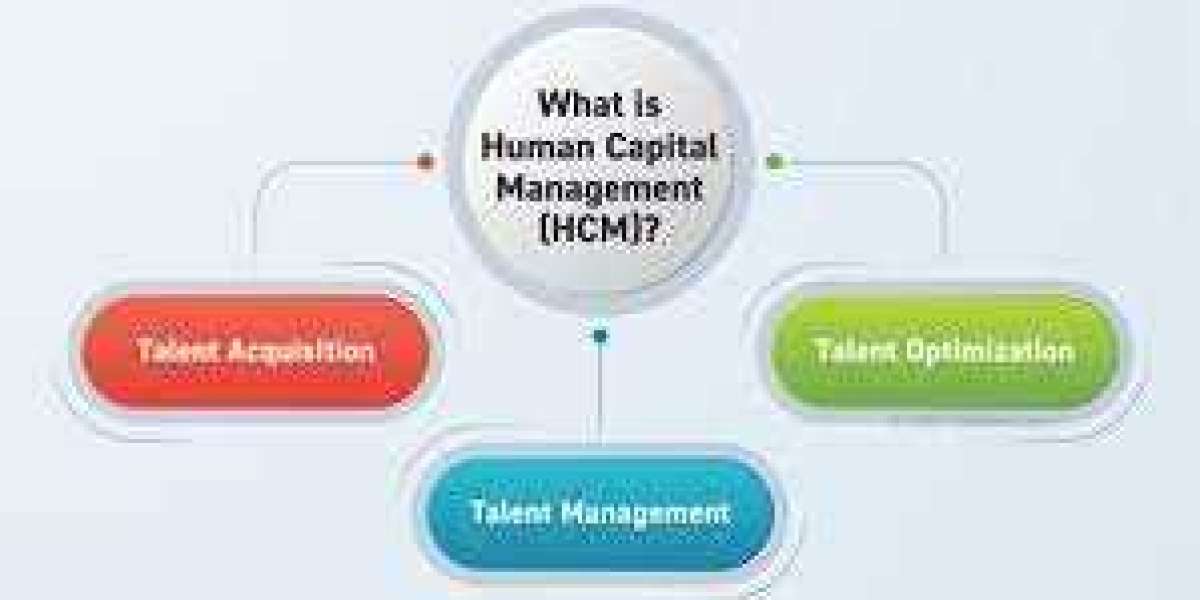Human Capital Management (HCM) Software Market: Comprehensive Overview, Key Segments, Industry Updates, Leading Companies, Market Drivers, and Regional Insights
Market Overview
The Human Capital Management (HCM) software market is experiencing rapid growth, driven by the increasing need for efficient workforce management in a dynamic business environment. HCM software integrates a range of HR functions, including recruitment, onboarding, payroll, benefits administration, performance management, and learning and development. This integration allows organizations to streamline HR processes, enhance employee engagement, and make data-driven decisions. Human Capital Management (HCM) Software Market is projected to grow from USD 18.2 Billion in 2024 to USD 33.4 billion by 2032.
The market's expansion is fueled by the growing adoption of cloud-based solutions, which offer scalability, flexibility, and cost savings. Additionally, advancements in artificial intelligence (AI) and machine learning (ML) are transforming HCM software, providing predictive analytics and automating routine tasks. This evolution not only boosts efficiency but also allows HR professionals to focus on strategic initiatives.
Request To Free Sample of This Strategic Report - https://www.marketresearchfuture.com/sample_request/1425
Key Market Segments
Deployment Mode
- On-Premises: Traditional on-premises HCM solutions, while still in use, are gradually being overshadowed by cloud-based alternatives due to their higher initial costs and maintenance requirements.
- Cloud-Based: Cloud-based HCM software dominates the market, offering seamless updates, remote accessibility, and reduced IT infrastructure costs.
Organization Size
- Large Enterprises: These organizations require comprehensive HCM solutions with advanced features and robust analytics to manage their large and diverse workforces.
- Small and Medium Enterprises (SMEs): SMEs are increasingly adopting HCM software to enhance operational efficiency and remain competitive, often opting for scalable, cost-effective cloud solutions.
End-User Industry
- IT and Telecom: The tech industry leads in HCM software adoption, driven by the need for skilled talent management and high employee turnover.
- Healthcare: HCM solutions in healthcare ensure compliance with regulatory requirements and improve workforce planning.
- Retail: Retailers utilize HCM software for efficient staffing, payroll management, and performance tracking.
- BFSI (Banking, Financial Services, and Insurance): The BFSI sector leverages HCM for risk management, regulatory compliance, and talent acquisition.
- Manufacturing: Manufacturing companies benefit from HCM solutions to manage diverse workforces and streamline labor-intensive processes.
Industry Latest News
- AI Integration: Leading HCM software providers are integrating AI and ML to enhance predictive analytics, improve candidate matching, and automate routine HR tasks.
- Mobile Accessibility: The push towards mobile-friendly HCM solutions enables employees and HR managers to access crucial information and perform tasks on the go.
- Focus on Employee Experience: Modern HCM software emphasizes user-friendly interfaces and features that enhance employee engagement and satisfaction.
- Data Security Enhancements: With growing concerns over data privacy, HCM vendors are prioritizing robust security measures to protect sensitive employee information.
- SAP SE: Known for its comprehensive SuccessFactors suite, SAP SE provides robust HCM solutions catering to various industries.
- Workday, Inc.: Workday offers an intuitive cloud-based HCM platform, renowned for its advanced analytics and user-friendly interface.
- Oracle Corporation: Oracle's HCM Cloud is a leading solution that integrates with its ERP system, providing a seamless experience for large enterprises.
- ADP, LLC: ADP offers a wide range of HCM services, from payroll to talent management, and is favored for its reliability and customer support.
- Ultimate Software: Known for its UltiPro product, Ultimate Software provides comprehensive HCM solutions with a strong focus on employee experience and engagement.
- Ceridian HCM, Inc.: Ceridian’s Dayforce HCM platform is recognized for its continuous payroll calculation and real-time data analytics.
Market Drivers
- Increasing Demand for Workforce Optimization: Organizations are seeking HCM solutions to optimize workforce productivity and efficiency.
- Shift to Cloud-Based Solutions: The flexibility, scalability, and cost benefits of cloud-based HCM software drive its widespread adoption.
- Regulatory Compliance: HCM software helps organizations comply with complex labor laws and regulations, reducing the risk of legal issues.
- Focus on Employee Engagement and Retention: Enhancing employee experience and engagement is crucial for retention, prompting investment in advanced HCM solutions.
- Data-Driven Decision Making: The need for actionable insights and data-driven HR strategies fuels the adoption of HCM software with robust analytics capabilities.
Regional Insights
- North America: The largest market for HCM software, driven by technological advancements, high adoption rates of cloud solutions, and the presence of major industry players. The U.S. leads in innovative HR practices and the implementation of advanced HCM technologies.
- Europe: Europe shows significant growth, with countries like the UK, Germany, and France leading the charge. Strict labor laws and a focus on employee well-being drive the adoption of comprehensive HCM solutions.
- Asia-Pacific: The fastest-growing region, with increasing digital transformation and HR modernization in countries like China, India, and Japan. The expanding SME sector in this region further boosts the demand for scalable HCM solutions.
- Latin America: Growing awareness of the benefits of HCM software and economic development in countries like Brazil and Mexico contribute to market growth.
- Middle East and Africa: The market is gradually evolving, with a focus on improving organizational efficiency and compliance with labor regulations in countries like the UAE and South Africa.
Ask for Customization - https://www.marketresearchfuture.com/ask_for_customize/1425
Conclusion
The Human Capital Management (HCM) software market is poised for sustained growth, driven by technological advancements, the shift to cloud-based solutions, and the increasing focus on workforce optimization. Key market segments, including deployment modes, organization sizes, and end-user industries, highlight the diverse applications and benefits of HCM software. Industry leaders like SAP, Workday, Oracle, ADP, Ultimate Software, and Ceridian continue to innovate, integrating AI and enhancing mobile accessibility to meet evolving customer needs.
As organizations worldwide recognize the strategic value of effective human capital management, the demand for advanced HCM solutions will only intensify. Regional insights underscore the global nature of this market, with significant opportunities in North America, Europe, Asia-Pacific, Latin America, and the Middle East and Africa. In this dynamic landscape, staying informed about industry trends and advancements is crucial for businesses aiming to leverage HCM software to achieve their HR objectives and drive organizational success








